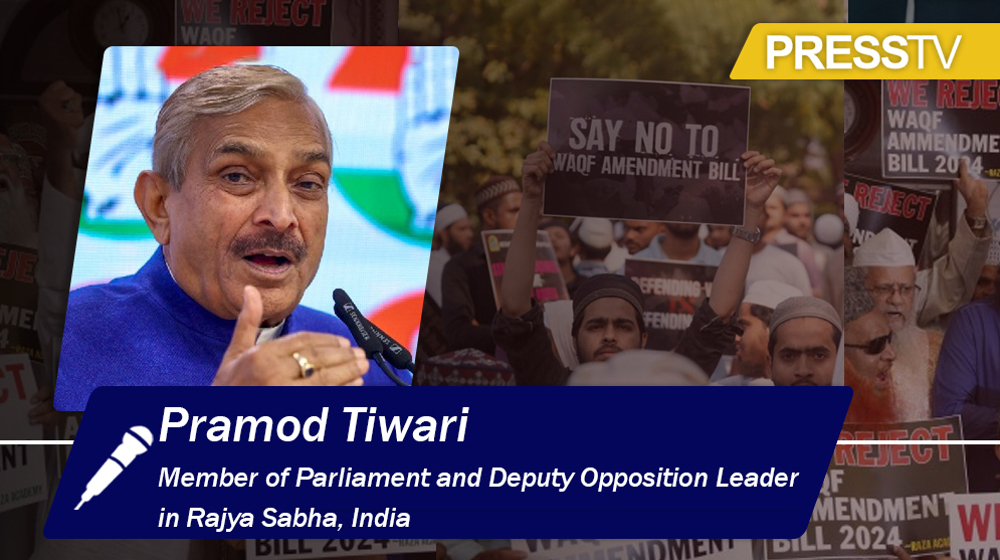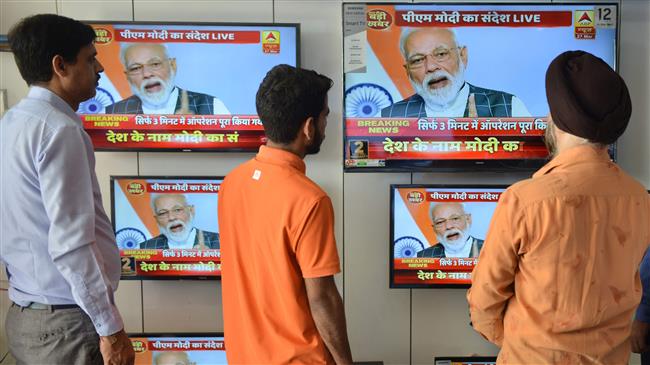India shoots down own satellite, declares self 'space power'
India shot down a satellite of its own with a missile on Wednesday, joining the world’s most advanced space superpowers; and prompting its arch rival Pakistan to urge avoiding militarization of space.
Prime Minister Narendra Modi said in a television broadcast that an anti-satellite missile fired from a testing facility in Odisha, eastern India, downed the live satellite in orbit at about 300 kilometers in “a difficult operation” that lasted some three minutes.
“Our scientists shot down a live satellite 300 kilometers away in space, in low-earth orbit,” Modi said.
He hailed India’s first test of such technology as a major breakthrough that establishes it as a space power. India would only be the fourth country to have used such an anti-satellite weapon after the United States, Russia and China, Modi added.
“India has made an unprecedented achievement today.”
“India registered its name as a space power.”
The Indian Foreign Ministry said in a statement that the latest test was aimed at protecting India's assets in space against foreign attacks.
"The capability achieved... provides credible deterrence against threats to our growing space-based assets from long-range missiles, and proliferation in the types and numbers of missiles,” the statement read.
The three-minute test in the lower atmosphere ensured there was no debris in space and the remnants would "decay and fall back on to the earth within weeks," it added.
Anti-satellite weapons allow for attacks on enemy satellites and provide a technology base to intercept ballistic missiles. Such capabilities have raised fears of weaponization of space and setting off a race between rivals.
Pakistan: Every nation should avoid militarization of space
In a statement after the test, Pakistan said space is the "common heritage of mankind and every nation has the responsibility to avoid actions which can lead to the militarization of this arena."
"We hope that countries which have in the past strongly condemned demonstration of similar capabilities by others will be prepared to work towards developing international instruments to prevent military threats relating to outer space," the statement by Pakistan’s Foreign Ministry said without mentioning India by name.
"Boasting of such capabilities is reminiscent of Don Quixote's tilting against windmills," it said, in a reference to the delusional hero of the 17th-century Spanish novel by Miguel de Cervantes.
Separately, the United States and Russia have not made any comment on the Indian test. But China's Foreign Ministry said it hoped all countries "can earnestly protect lasting peace and tranquility in space."
Brahma Chellaney, a security expert at New Delhi's Center of Policy Research, said the United States, Russia and China were pursuing anti-satellite (ASAT) weapons.
"Space is being turned into a battlefront, making counterspace capabilities critical. In this light, India's successful 'kill' with an ASAT weapon is significant."
Pakistan and India have routinely tested ballistic missiles since they first became nuclear capable in 1998 and 1974, respectively.
Neither of the neighbors has signed the Non-Proliferation Treaty (NPT) or other international regulatory pacts that restrict developing or testing nuclear weapons.
Uday Bhaskar, director of the Society for Policy Studies, a Delhi think-tank, said a concern for India was that China could help its old ally Pakistan neutralize any advantage.
"I don't think Pakistan has acquired that level of accomplishment yet by itself, but Pakistan is no longer seen alone," he said. "Pakistan and China have a very deep strategic kind of partnership. So some kind of sharing of capabilities can't be ignored."
India has had a space program for years. It successfully sent a low-cost probe to Mars in 2014 and plans its first manned space mission by 2022.

Waqf Bill not just an attack on Indian Muslims but on India’s constitutional fabric: MP

Bill to seize mosques in India gains presidential assent

Indian parliament passes bill seen as step to seizure of mosques
VIDEO | Less people visiting US due to restrictions
VIDEO | Press TV's news headlines
Netanyahu’s flight takes detour to US to avoid ICC arrest warrant: Reports
VIDEO | Palestinians stage general strike in West Bank as Israel intensifies Gaza genocide
VIDEO | Genocide in the Syrian coast!
Collapsing Empire: Yemen shatters the illusion of US air power, yet again
Ten Britons accused of war crimes during Israel’s Gaza genocide; complaint filed
Waqf Bill not just an attack on Indian Muslims but on India’s constitutional fabric: MP









 This makes it easy to access the Press TV website
This makes it easy to access the Press TV website